The Chandrayaan-2 orbiter's ensemble of eight scientific instruments was performing very well and is expected to continue its stellar work for about seven and a half years, ISRO Chairman K Sivan said on Saturday.
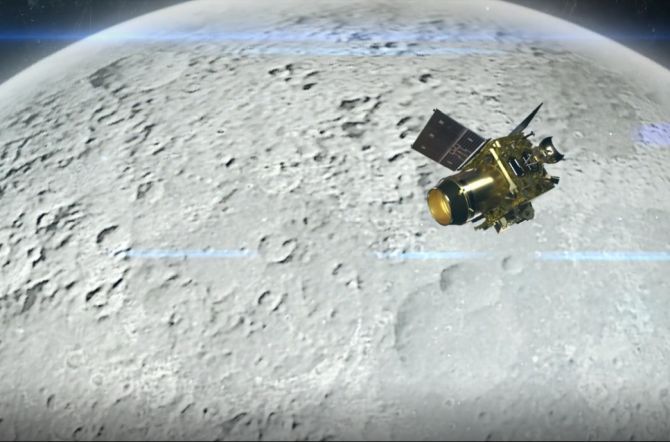
As the prospects of re-establishing contact with Chandrayaan-2's 'Vikram' lander have virtually ended after the conclusion of 14 Earth days, ISRO said it will take up a study to ascertain what exactly happened to it.
Sivan told reporters in Bhubaneshwar, "...first, we have to understand what exactly happened to the lander."
He said the orbiter with eight scientific instruments is doing very well, adding "each instrument is doing exactly whatever we wanted.
"...some of the pictures what we got were excellent and it is going to do a greater amount of science (research)," he added.
Though the orbiter was initially planned for only a year, he said in view of "very optimum mission planning, we are able to get seven and a half years of life time. So we are going to get seven and a half years of science (research) not one year."
The lander with rover 'Pragyan' housed inside, lost communication with the ground station on September 7 during its final descent, just 2.1 kms above the lunar surface, minutes before the planned touch-down.
A national-level committee comprising academicians and ISRO experts is analysing the cause of the communication loss with 'Vikram', Sivan said.
"We have not been able to establish communication with the lander yet. As soon as we receive any data, necessary steps will be taken," he said.
ISRO made all-out efforts to re-establish contact with the lander ever since communication was lost on September 7.
ISRO has said that once lunar night falls, there would be no sunlight for the lander to generate power for its working and also it was not designed to operate in the extremely cold temperature of Moon during the phase.
The lander, designed to execute a soft landing on the moon's surface, and the rover have a mission life of one Lunar day, which is equivalent to 14 earth days and ended early on Saturday.
Sivan said the Chandrayaan-2 mission achieved 98 per cent success because of two objectives -- one is science and the other technology demonstration.
"In case of technology demonstration, the success percentage was almost full," he said.
He said ISRO is focusing on another moon mission by 2020.
"Discussion is on about the future plan... nothing is finalised. Our priority is on an unmanned mission by next year. First, we have to understand what exactly happened to the lander," he said.
While addressing the eighth convocation of IIT, Bhubaneswar, Sivan asserted that though Chandrayaan-2 did not go as per script, it will have no bearing with on the 'Gaganyaan' mission.
"By December 2020, we will have our first unmanned mission of human space plane. The second unmanned human space plane, we target for July 2021," Sivan said.
"By December 2021, the first Indian will be carried by our own rocket ... This is the target ISRO is working for," he said amidst loud clapping by the audience.
The Gaganyaan mission is extremely important for India as it will boost the science and technology capability of the country. "Therefore, we are working on a new target," he said.
Sivan asked students to take calculated risks and innovate. "If you are not taking a chance, there is no chance of achieving anything significant in life. Take calculated risks. When you take calculated risks, you save yourself from problematic areas".
Stressing on innovation, he said it comes from high level of risk and failure. "I need not tell you how many times Edison failed in inventing the light bulb or how many times ISRO failed in the launch of our launch vehicles. But this failure did not become an obstacle. We (ISRO) use these failures as learning opportunities," the ISRO chief said.
Sivan told the gathering "Dr Kalam said your dream or idea must not make you sleep. Get inspired by great leaders, but do not try to emulate them. You have to come out with original solutions and not a copy of somebody else's idea. If you want to become a Dr Kalam, do not chase his hair style. You follow his idea and the message he gave".
The space scientist said while the country may be perceived poor by many people it occupies the first position in the world for sending remote sensing satellites.
Despite the progress made over the last half a century, there are many unsolved issues of poverty and hunger, health and sanitation and clean drinking water, he said and called upon IITians to come forward to help solve them.
"As Gandhiji said local problems need local solutions," Sivan added.
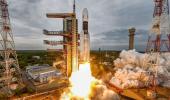

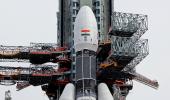




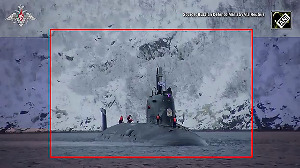

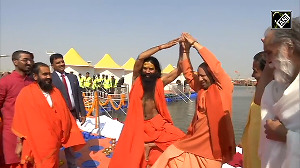
 © 2025
© 2025